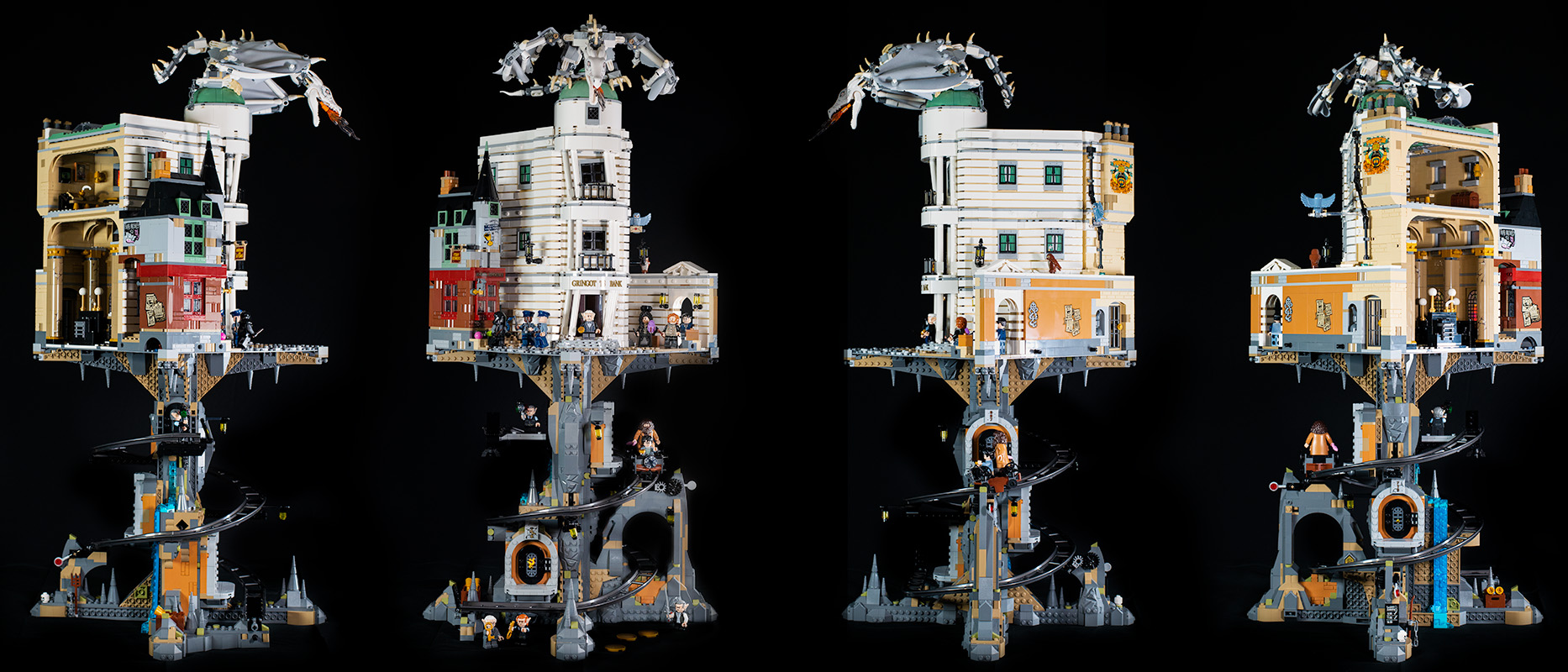GamesRadar+ Verdict
This is a truly magnificent set marred only by a few disappointing stickers. Its unique build is a bafflingly brilliant example of the company's out-of-the-brick engineering, and the exterior of Lego Gringotts Bank itself is one of the finest-looking modular buildings to date. The price point is a big ask for those looking to simply sandwich the modular between its Diagon Alley neighbours, but judge this monster build as a standalone Harry Potter Collector’s Edition megalith and it’s right up there with the Wizarding World’s greatest Lego sets. This magical modular has whetted our appetite for a big ol’ Hogsmeade set. (Please, Lego?)
Pros
- +
You won't find another Lego set like it
- +
One of the coolest-looking 'modulars' ever
- +
Surprisingly sturdy when attached
- +
We love the dragon
- +
Chocked full of details from the movies
- +
The mine-cart track is really neat
- +
The Grand Hall really does look grand
- +
Nice selection of minifigures
Cons
- -
That entrance sticker
- -
Disappointing exterior window stickers
- -
We would have liked to have seen the larger, second dome on the roof
Why you can trust GamesRadar+
To call the Lego Gringotts Bank (76417) one of the most anticipated additions to Billund’s brick-built wizarding world is an understatement. At the end of 2020, the Lego Diagon Alley (75978) kit was released to critical acclaim and remains one of the best Lego sets available on the market right now. But one building in particular was suspiciously absent - Gringotts itself.
It took a couple of years for fans to finally get the announcement they’d been waiting for... but not necessarily the one they expected. Instead of a simple modular addition that would sandwich itself between the existing Diagon Alley buildings, the new Lego Gringotts Bank was a near 5,000-piece behemoth. And the magical bank was only the half of it - literally. Below the façade sits its impenetrable underground vaults, and a mine cart to boot.
Even though Lego made it clear that the bank could be parted from this imposing underground section and still serve as a modular building, the reception was mixed. Some brick builders thought it looked incredible, while others questioned why they had to purchase a set with an MSRP of $429.99 / £369.99 just to get the modular building they’d been waiting for. And yet, we deny any Lego Harry Potter fan who wasn’t at the very least intrigued. Because one thing’s for sure - there’s never been a Lego set quite like the Lego Harry Potter Gringotts Wizarding Bank.
So, we’ve brought our key (and our wand) to find out what's lurking in this magical set’s vaults…
Lego Gringotts - features
| Price | $429.99 / £369.99 |
| Ages | 18+ |
| Pieces | 4,801 |
| Minifigures | 13 |
| Height | 30" (75cm) |
| Width | 13" (32cm) |
| Depth | 10" (25cm) |
| Item Number | 76417 |
The Lego Harry Potter Gringotts Wizarding Bank towers at a jaw-dropping 75cm, making it one of the tallest Lego sets ever produced. It’s also one of the largest, comprising a humongous 4,801 pieces. When it comes to Lego Harry Potter, only Hogwarts Castle (6,020 pieces), Diagon Alley (5,544 pieces), and Hogwarts Express (5,129 pieces) contain more bricks.
Alongside Gringotts Bank, the underground vaults, and the Ukrainian Ironbelly, this set comes with three gold galleon coins. These exclusive items are a bit of an Easter egg and can be paired with the Hogwarts Icons (76391) set (MSRP $299.99 / £259.99).
All this has been a long time coming. Go back to 2011 and Lego’s dated but still excellent first stab at Diagon Alley (10217) featured only three buildings, and the centerpiece was Gringotts' magnificent marble-clad bank - but it absolutely pales in comparison to this much more ambitious (not to mention screen-accurate) kit.
Weekly digests, tales from the communities you love, and more
Lego Gringotts Bank – how easy is it to build?
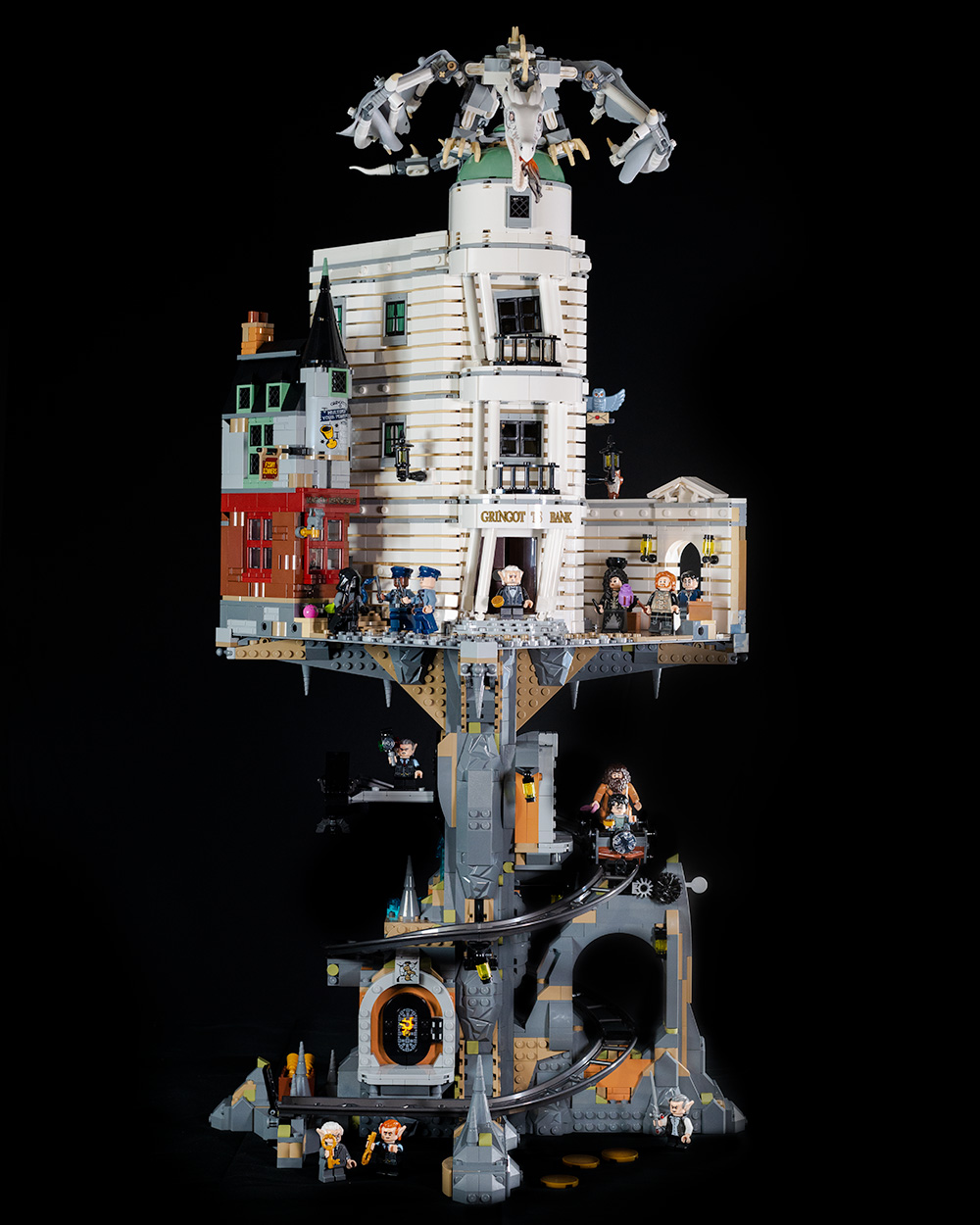
- 4,801 pieces
- Mostly simple building techniques
- The Ukrainian Ironbelly dragon is a really fun build
This mammoth project is spread across four instruction booklets and comprises 31 bagged sections and three separate builds: the Gringotts vaults, the Ukrainian Ironbelly dragon, and the bank itself. Booklet one is dedicated to one of two sections that make up the vaults, while booklet two tackles the second section and finishes with the dragon. Booklets three and four are dedicated to the Bank itself.
Unsurprisingly, the vaults feature a good portion of solid, structural building, but bits of landscaping and the neat little vaults themselves provide plenty of interesting respite. The two sections slide into each other to create a rigid cross shape that’s secured by two 11-hole Technic Beams. Once you’ve added the vaults, you then build the mine cart and lay the tracks, which is a lot of fun.
Despite the apparent complexity of this cavernous base, it’s impressively simple and features fewer Technic pieces than you might expect.
The dragon is a little more fiddly, but it's a simply delightful build that takes a while to complete thanks to the abundance of tiny pieces, providing both detail and ample articulation to form a variety of poses.
All told, the build took me a whopping 12 hours and 40 minutes to complete, at a relatively brisk pace, too
It’s nice that Lego chose to save the main course – and most involved build – until last, Gringotts Bank itself. As is often the case with Lego modular buildings, what earns them their 18+ rating isn’t so much the difficulty, but the tedium of adding row after row after row of 1 x 1 pieces or thin strips to make up walls.
If you’ve built a ‘modular’ before, it’s relatively standard fare. You begin by laying down tens of titles before gradually building up the walls and moving up through each floor respectively. Placing tile after tile onto SNOT bricks to build up that marble veneer sure is tedious, but it’s also hugely rewarding because the results are quite simply jaw dropping.
There are a couple of clever building techniques that are worth highlighting too. The first being the use of 1 x 1 tiles with clips and 1 x 1 round plates with bar handles to create the tilting pillars on the building’s frontage. And the second is a few skewed windows, ingeniously implemented by attaching each via a Technic pin, so they lean accordingly.
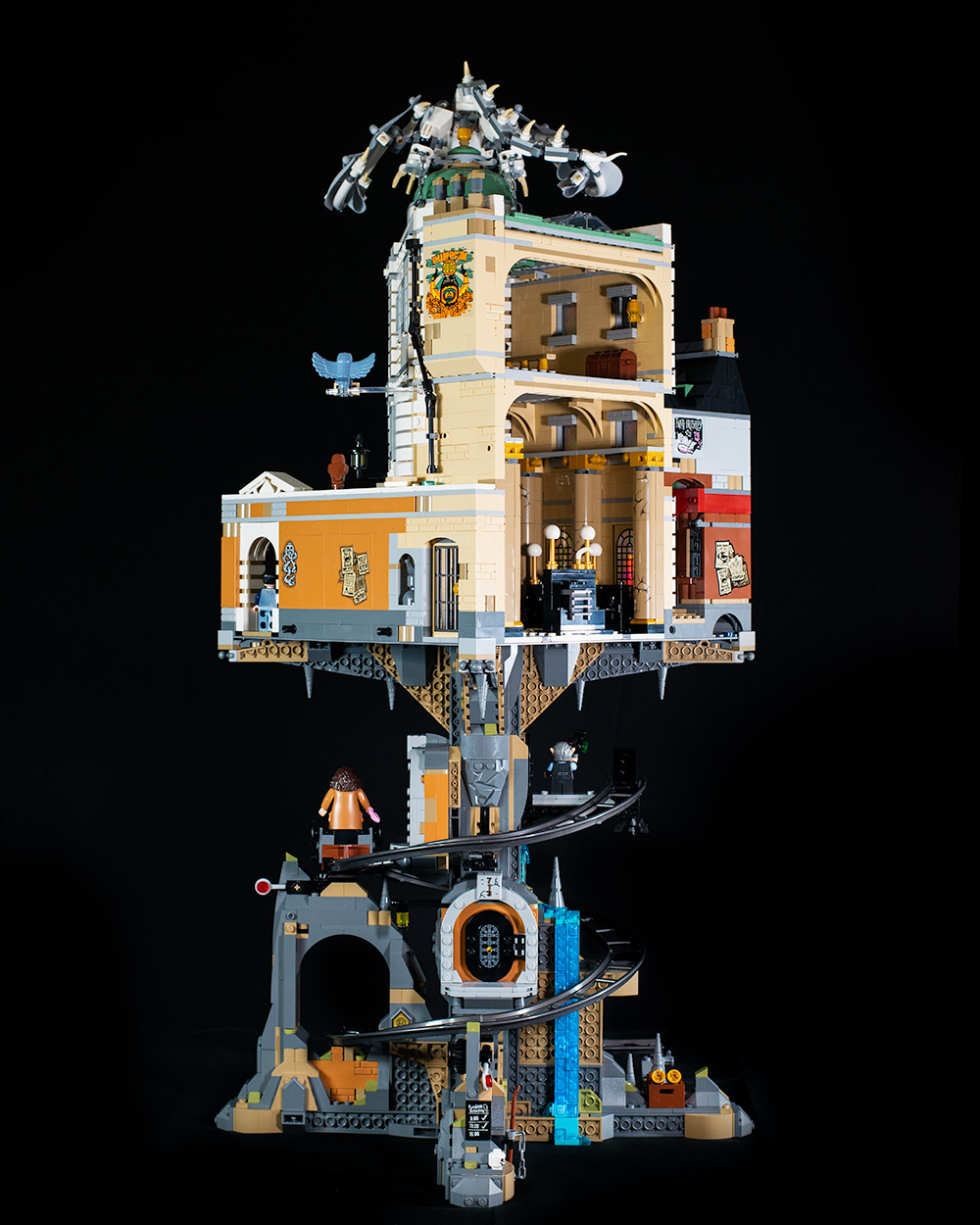
I'm less positive about another feature that fans will also groan at, though. This set doesn’t boast Lego’s most generous number of printed pieces, but stickers were always going to feature heavily regardless. All told, you have to stick down 50 of the things, and when you’re working on a set that’s this expensive, getting the “Gringotts Bank” stickers correct above the entrance is a bit of a heart-in-your-mouth moment. However, one of the sticker sheets is on a metallic film, used to represent the magical-looking windows in the Grand Hall, which is a nice addition.
All told, the build took me a whopping 12 hours and 40 minutes to complete, at a relatively brisk pace, too. The three separate builds and multiple instruction booklets make it a great set to put together with friends. And even though large Lego sets are always fragile up to a point, and interlocking the two criss-cross vault sections certainly justifies the 18+ rating, the time is largely spent simply laying down Lego bricks and watching the build come together. It's a lot of fun. Younger builders will certainly have fun playing with the minifigures and dipping in and out of a project that involves plenty of simple sections, with adult supervision of course.
Lego Gringotts – design
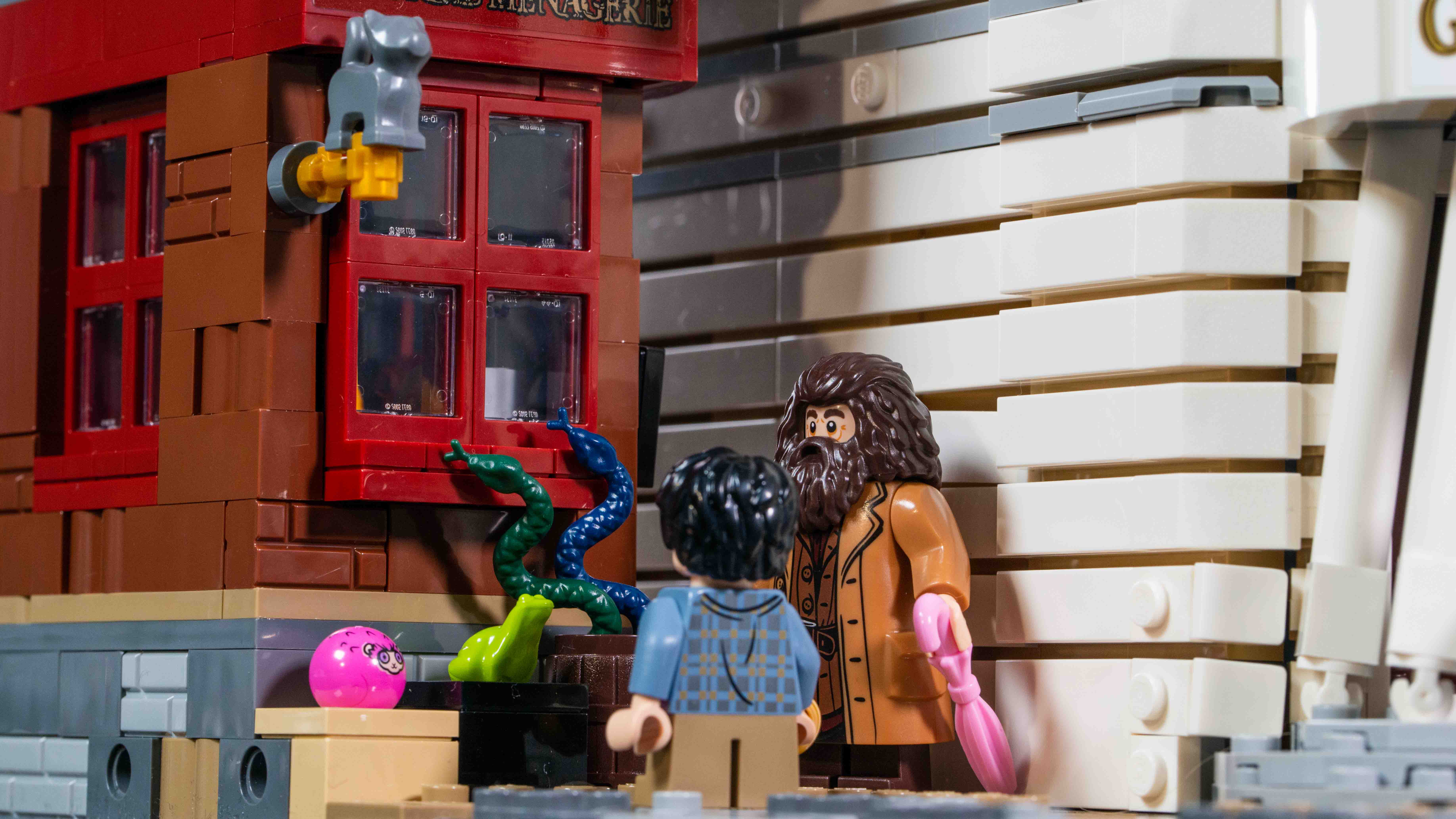
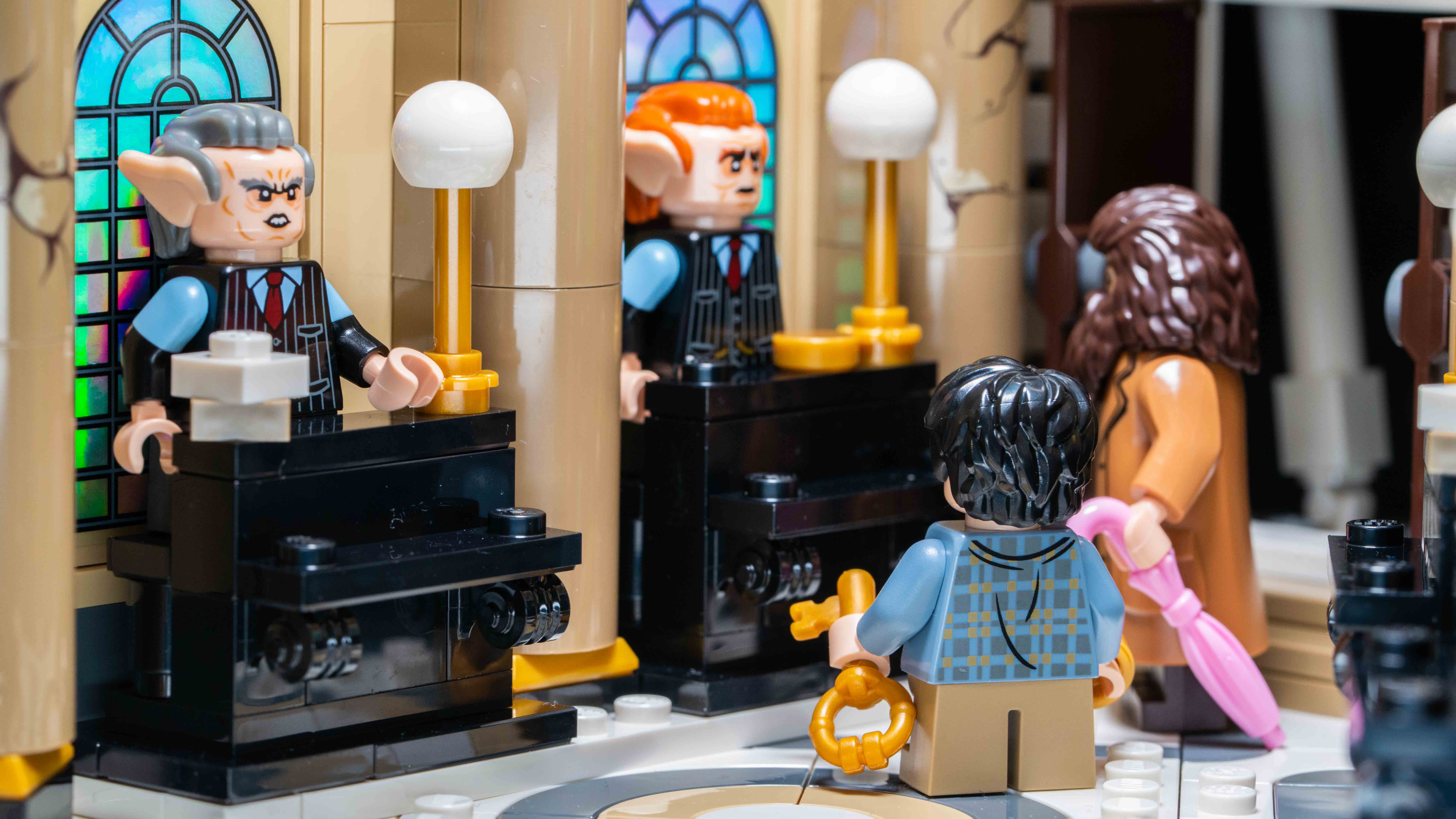
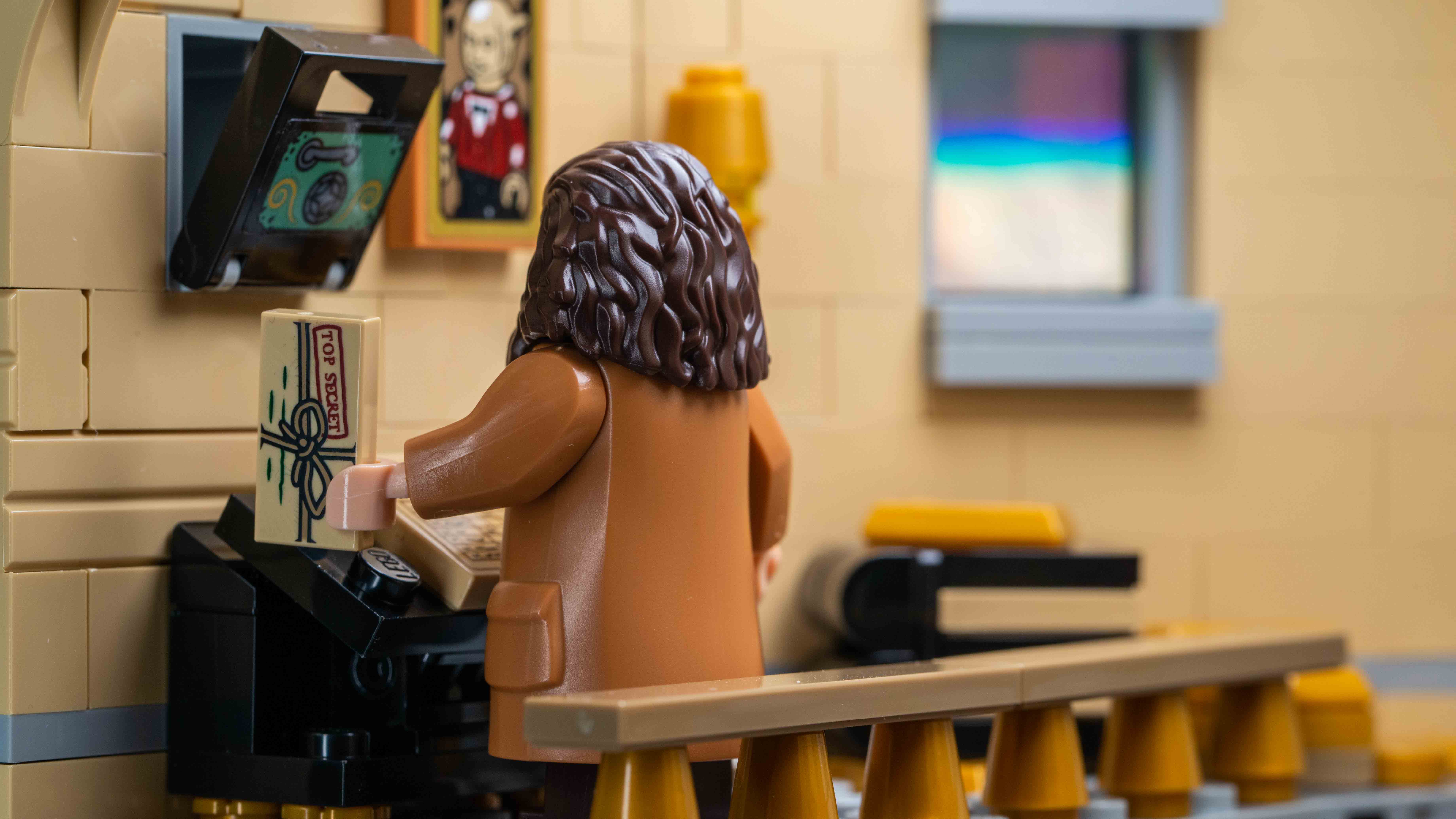
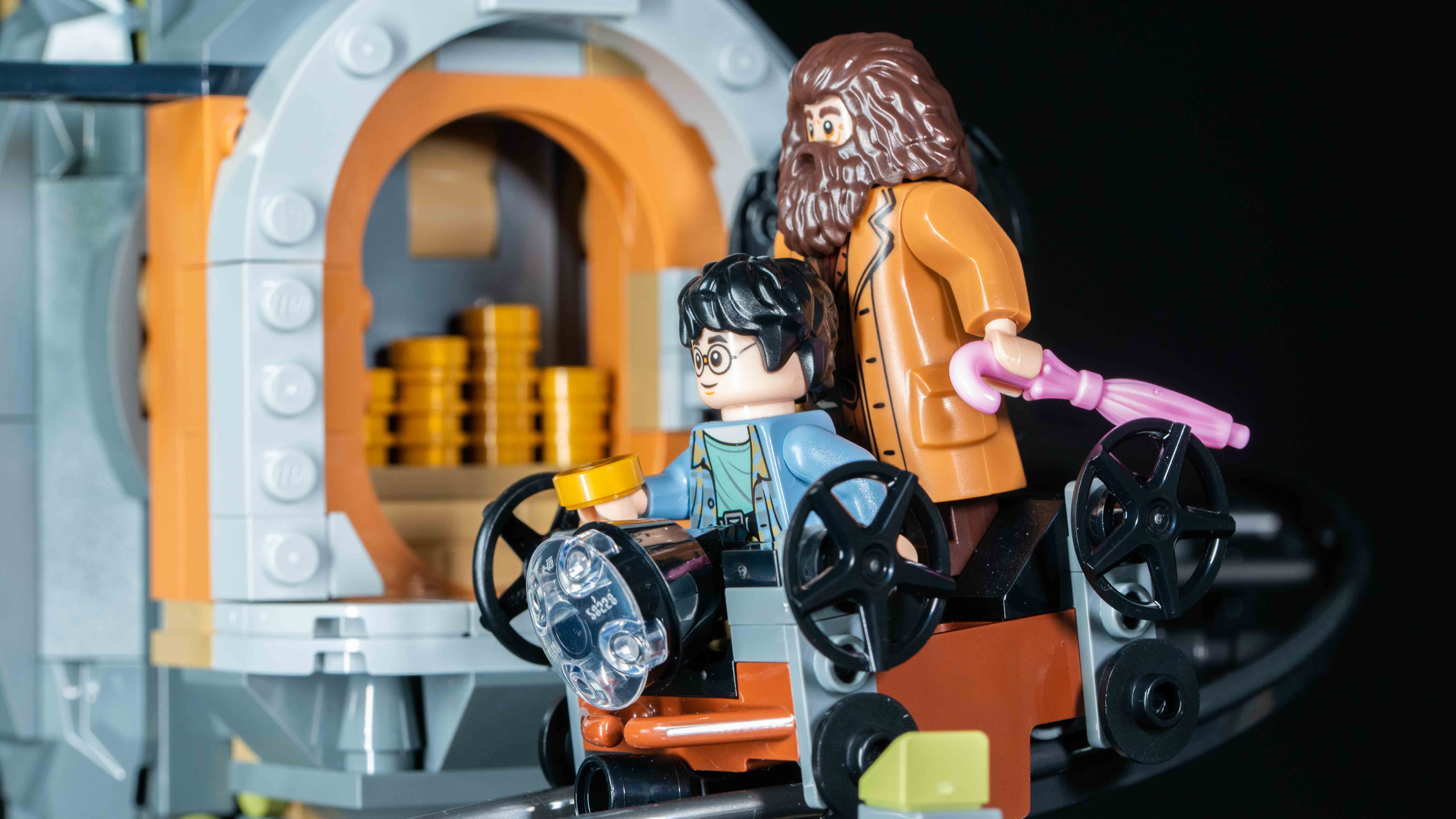
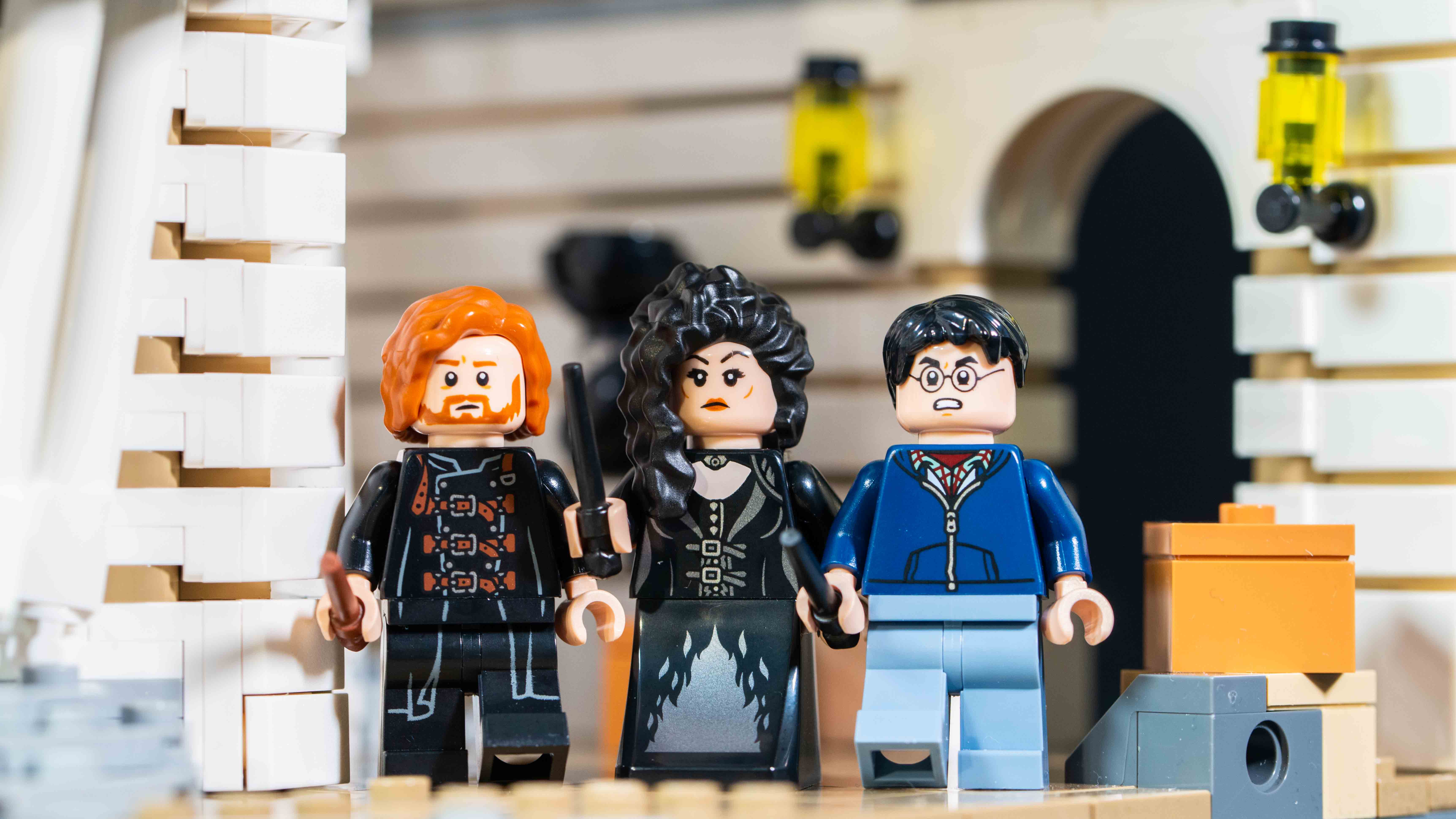
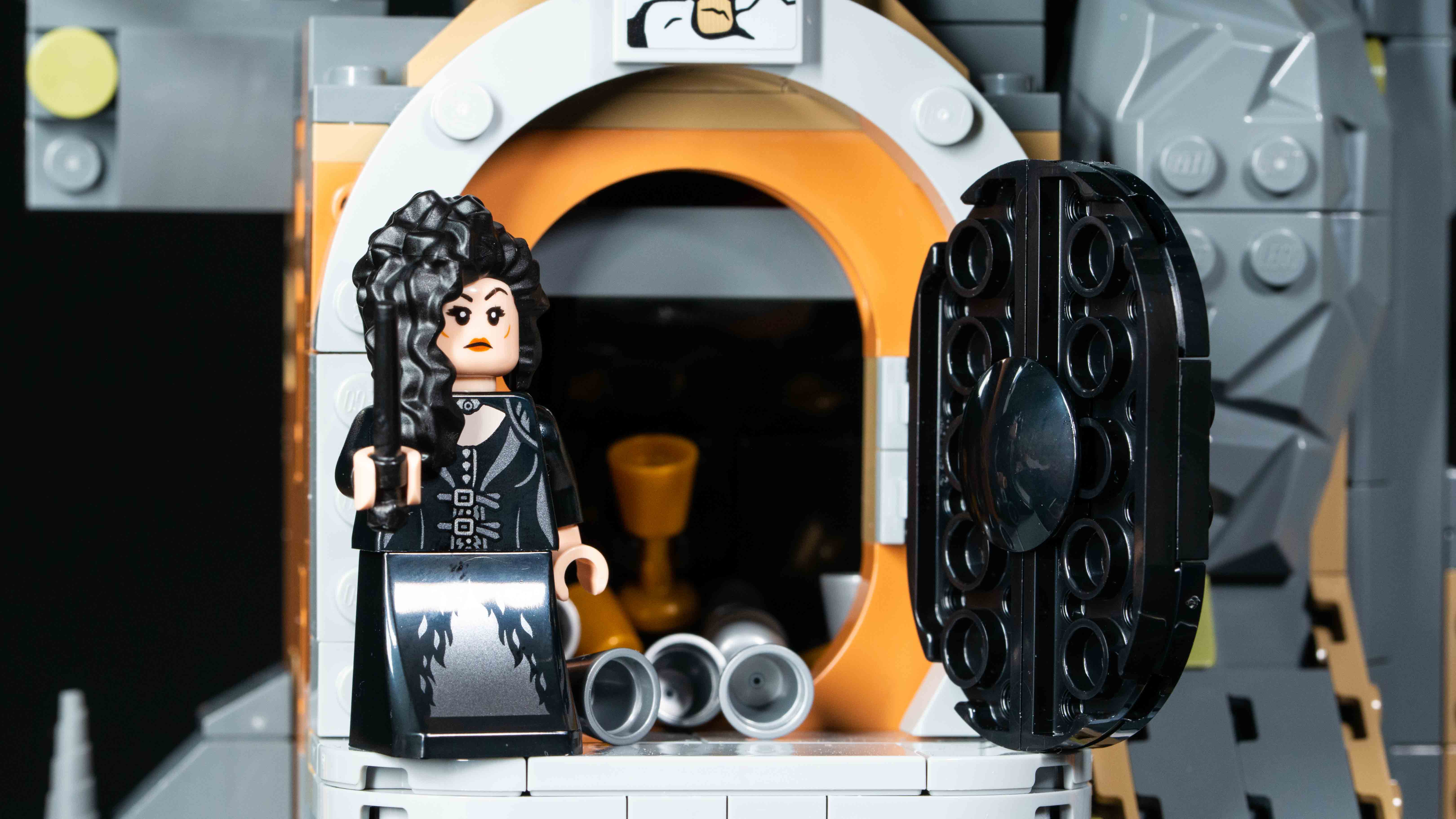
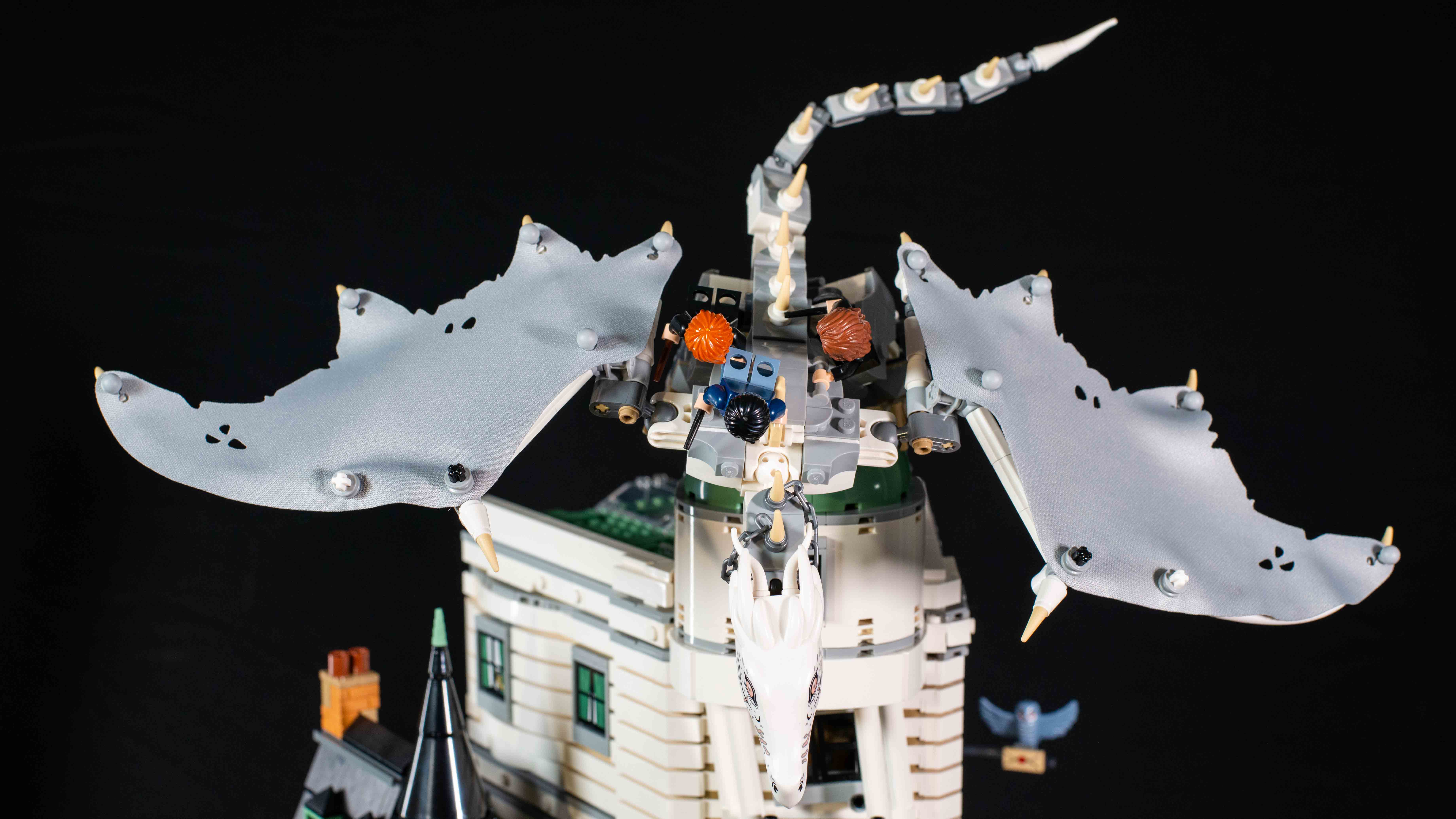
- A jaw-dropping Lego set
- Two very disappointing stickers
- Stunning interior considering the available space
The burning question from Lego fans all over the Wizarding World since this precarious-looking set’s announcement has been: how robust is it? Well, 'surprisingly robust' is the answer. This isn’t something you’d want to display in a busy thoroughfare, but I’ve done a few wobble tests – especially during the photoshoot – and I never felt like it was going to topple or break apart under its own weight. The danger zone comes when the two sections are attached/detached.
Alright, so picking up a modular building is never easy. Bendy baseplates can quickly separate from foundations, and it doesn’t take much force to break apart a wall. Having to line up a hulking modular, while pressing it down to secure it in place or lifting it off, only to jolt from the sudden separation of pieces, sounds terrifying. Thankfully, the underground vaults’ ingenious cross-shaped design affords you the room to place and remove the modular while keeping your hands firmly beneath the baseplate at all times.
Remarkably, nothing but gravity is holding the underground vaults and the bank together when they’re attached. The modular simply sits atop the vaults, with four 2 x 2 x 1 corner pieces preventing the baseplate from sliding off. This isn’t surprising as you can't attach studs to the underside of a baseplate. A multi-plate base, fixed onto the vaults via Technic pieces or studs, could have arguably proven more dangerous.
In short, there’s safety in the fluidity of motion when moving the building on and off its cavernous plinth.
Remarkably, nothing but gravity is holding the underground vaults and the bank together when they’re attached
Separated or connected, the entire playset truly is a sight to behold. Starting from the bottom, the mine-cart tracks are a neat playability feature and the drab vaults are much more detailed and interesting than photographs convey. Round the back is a stream of transparent, blue bricks used to create the Thief’s Downfall, a waterfall used to wash away the enchantments of any nefarious visitors.
Three of the four vaults open to reveal surprises: 687 holds Harry’s family fortune, 713 holds the Philosopher's Stone, and the Lestrange vault features a single goblet that, when pushed, rains goblets to simulate the Gemino Curse. There’s also an area with a chain and a feeding schedule scrawled onto a rock, so you can recreate the dragon’s breakout scene from the final film in the series.
And the details don’t stop there. Stalactites and stalagmites adorn the cavern’s roof and base respectively, while lanterns hang off the vaults and tiny green bricks represent pockets of algae and mosses. To summarize, it's a well thought-out design.
That extends beyond how it looks, by the way. Two working signals can be used to control the mine cart, so it stops immediately outside of 687 or 713 or continues right down to Bellatrix’s vault.
Meanwhile, the Ukrainian Ironbelly is a delightful sidebuild that pieces together much like the Lego Hungarian Horntail Dragon (MSRP $49.99 / £44.99), with an exclusive, printed headpiece. Like the Horntail, the articulated wings are a joy to put together and the cloth that represents the flaps of skin is slightly stretchy and virtually impossible to crease. Its feet also feature two 1 x 1 tiles with clips so it can be attached to the bank’s dome. Pair this with the fire piece that attaches to its mouth and you can recreate its position atop the Gringotts Bank from the Wizarding World of Harry Potter at Universal Orlando Resort.
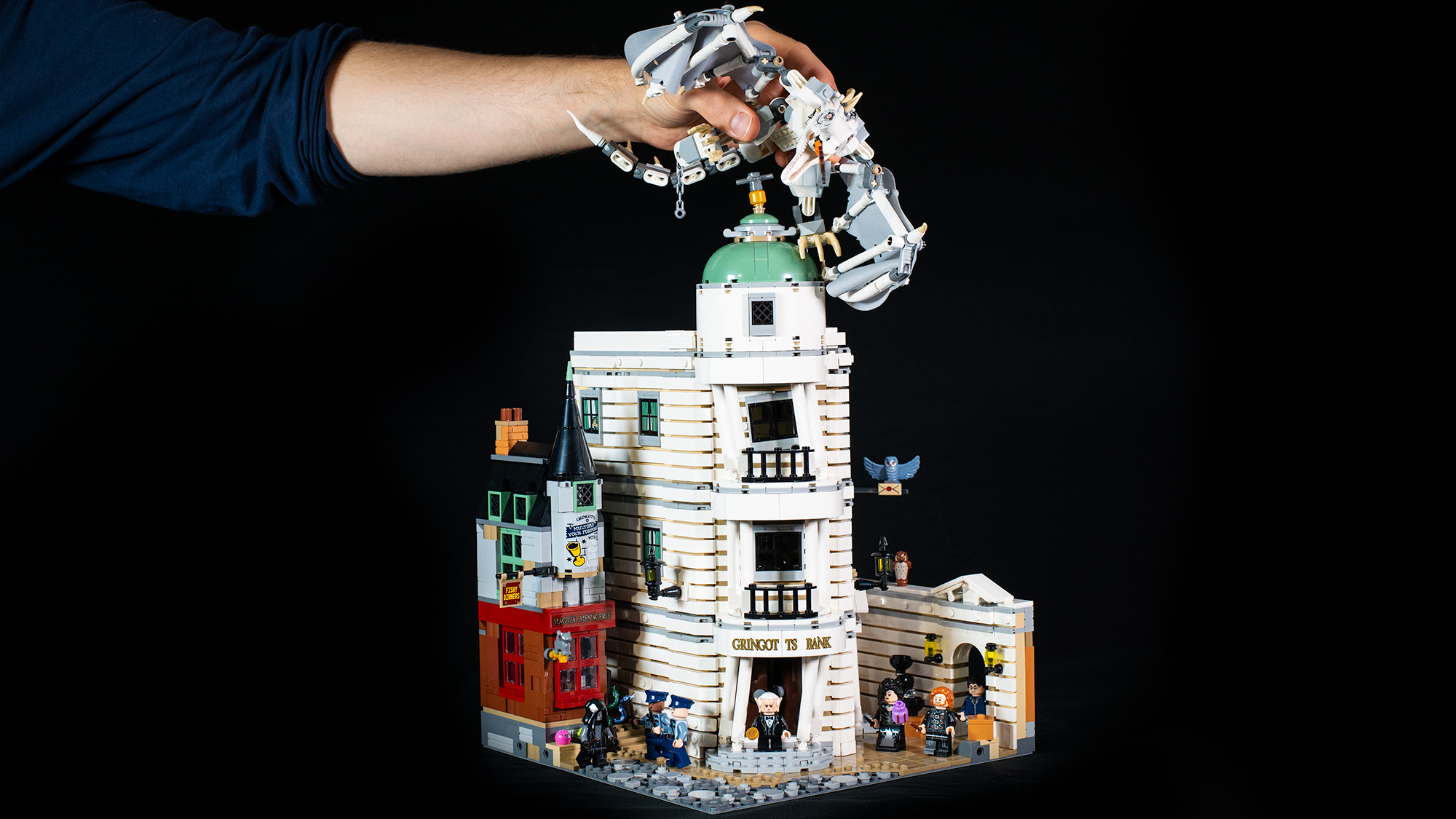
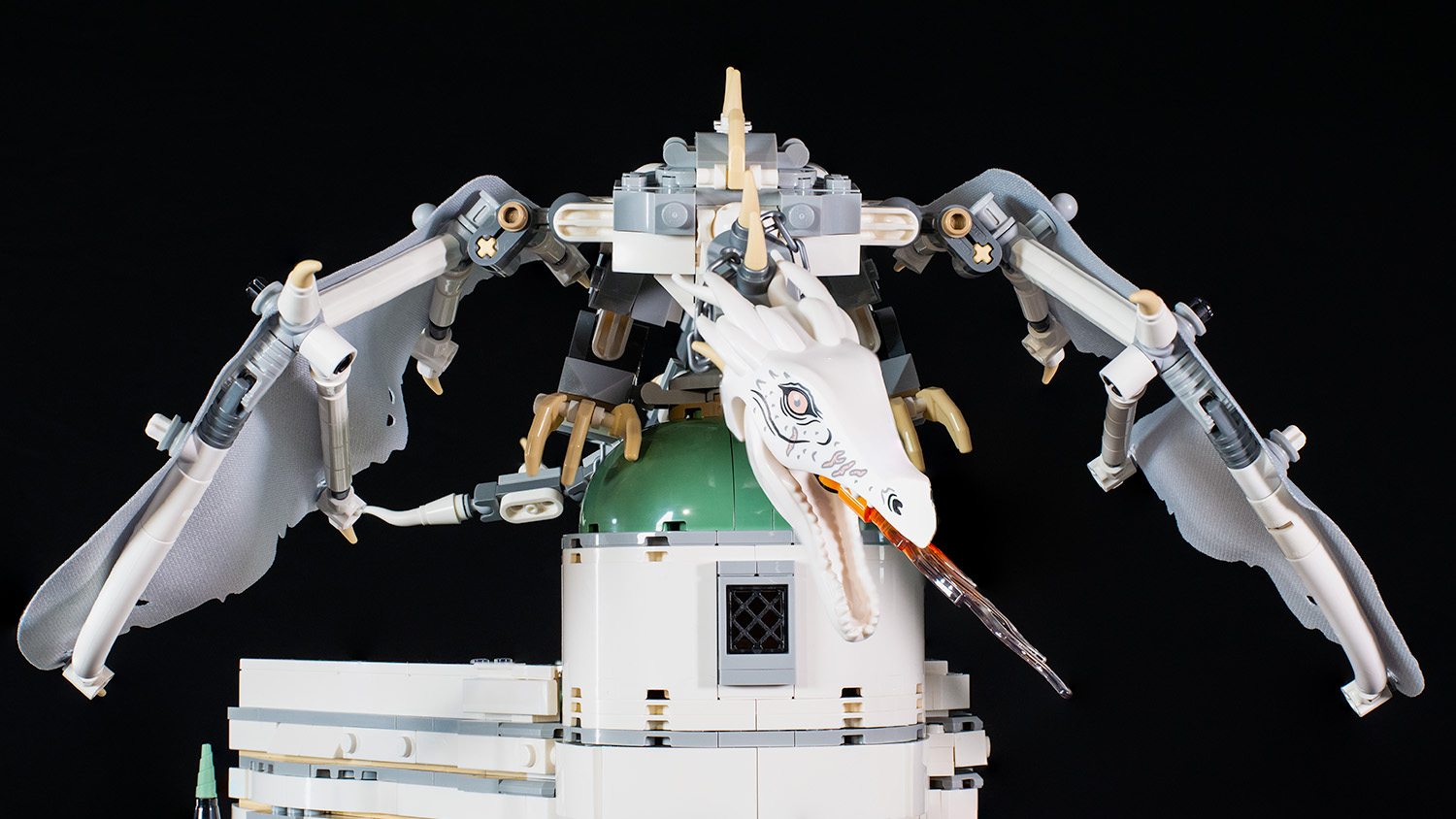
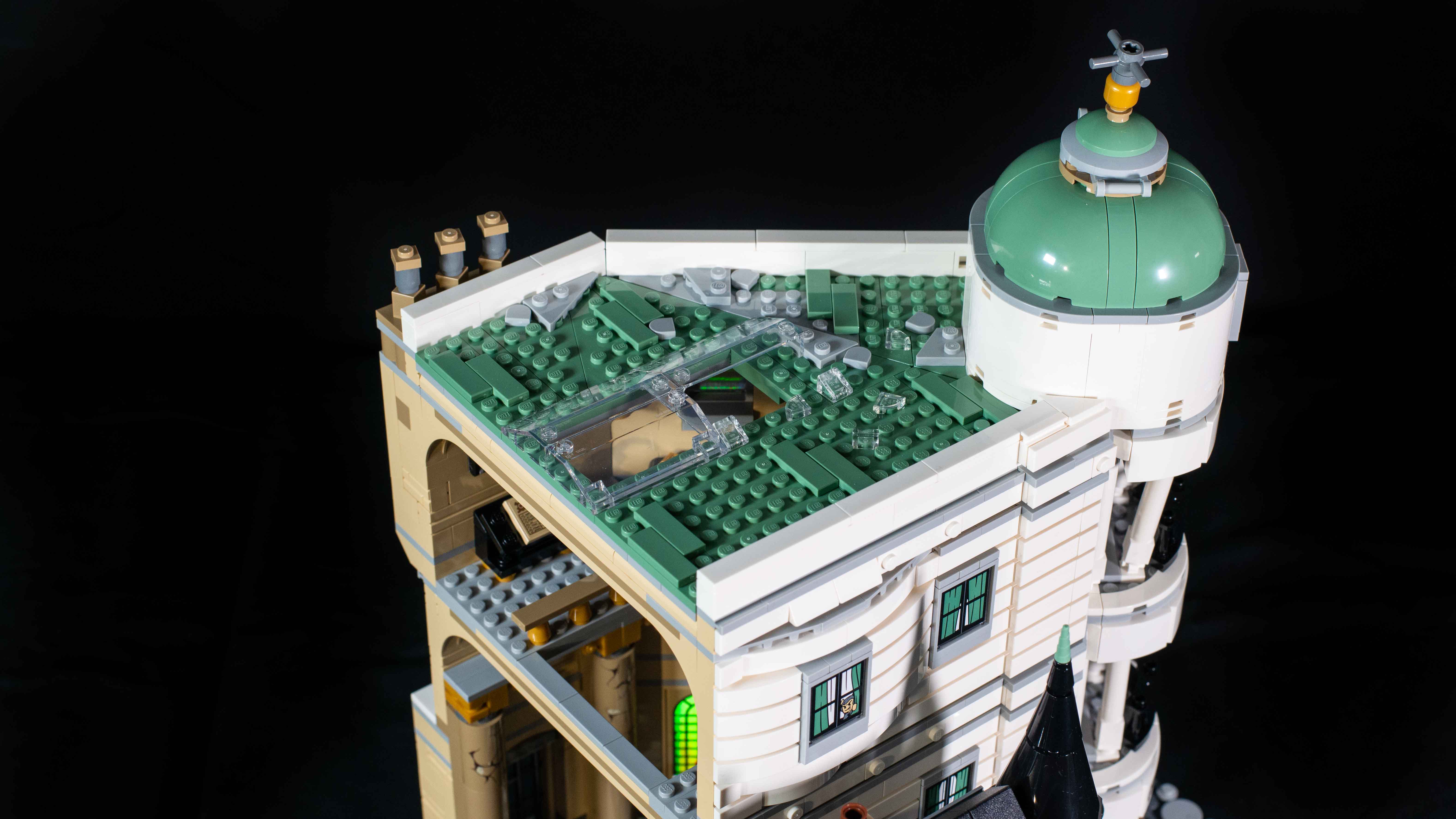
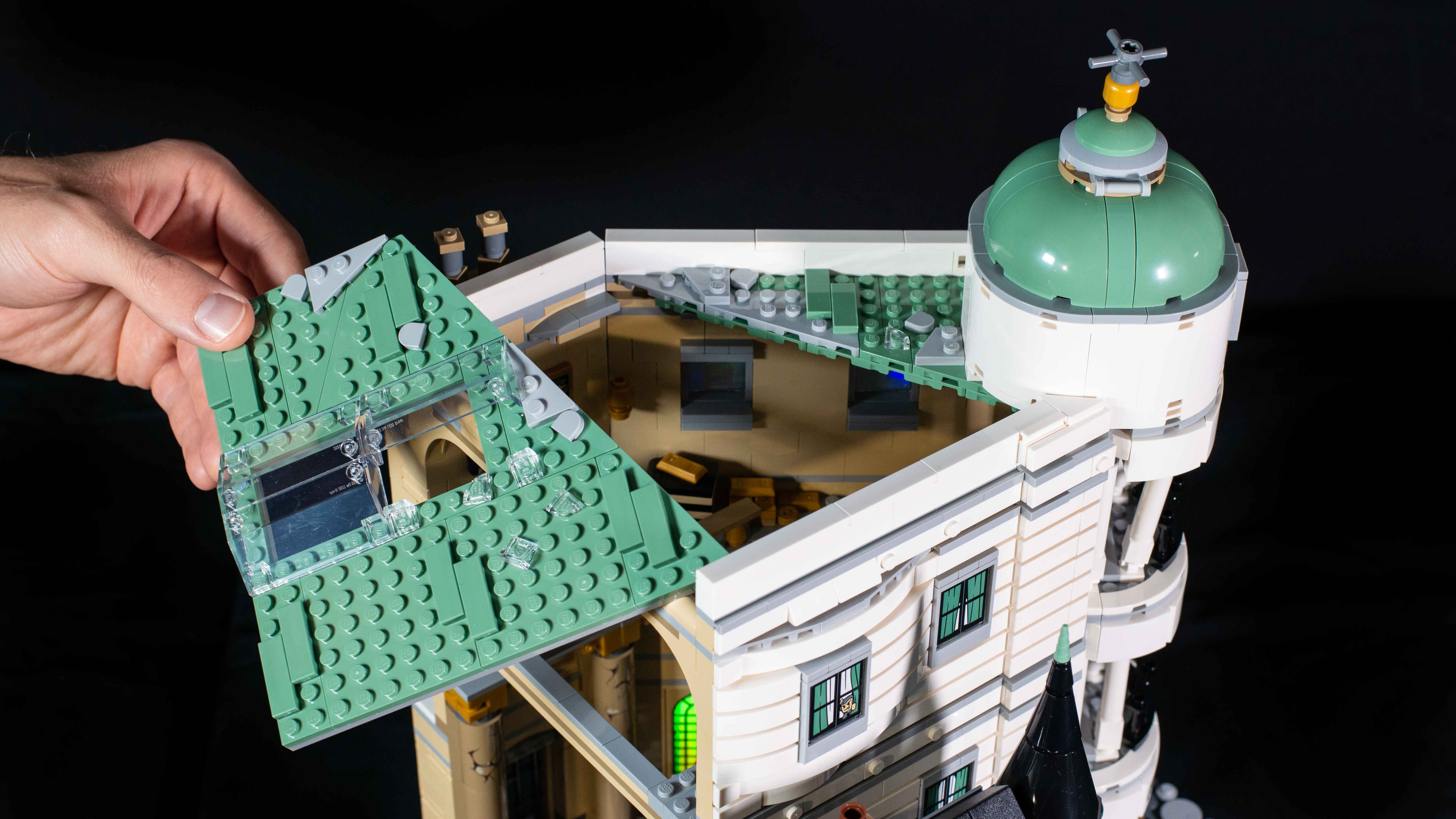
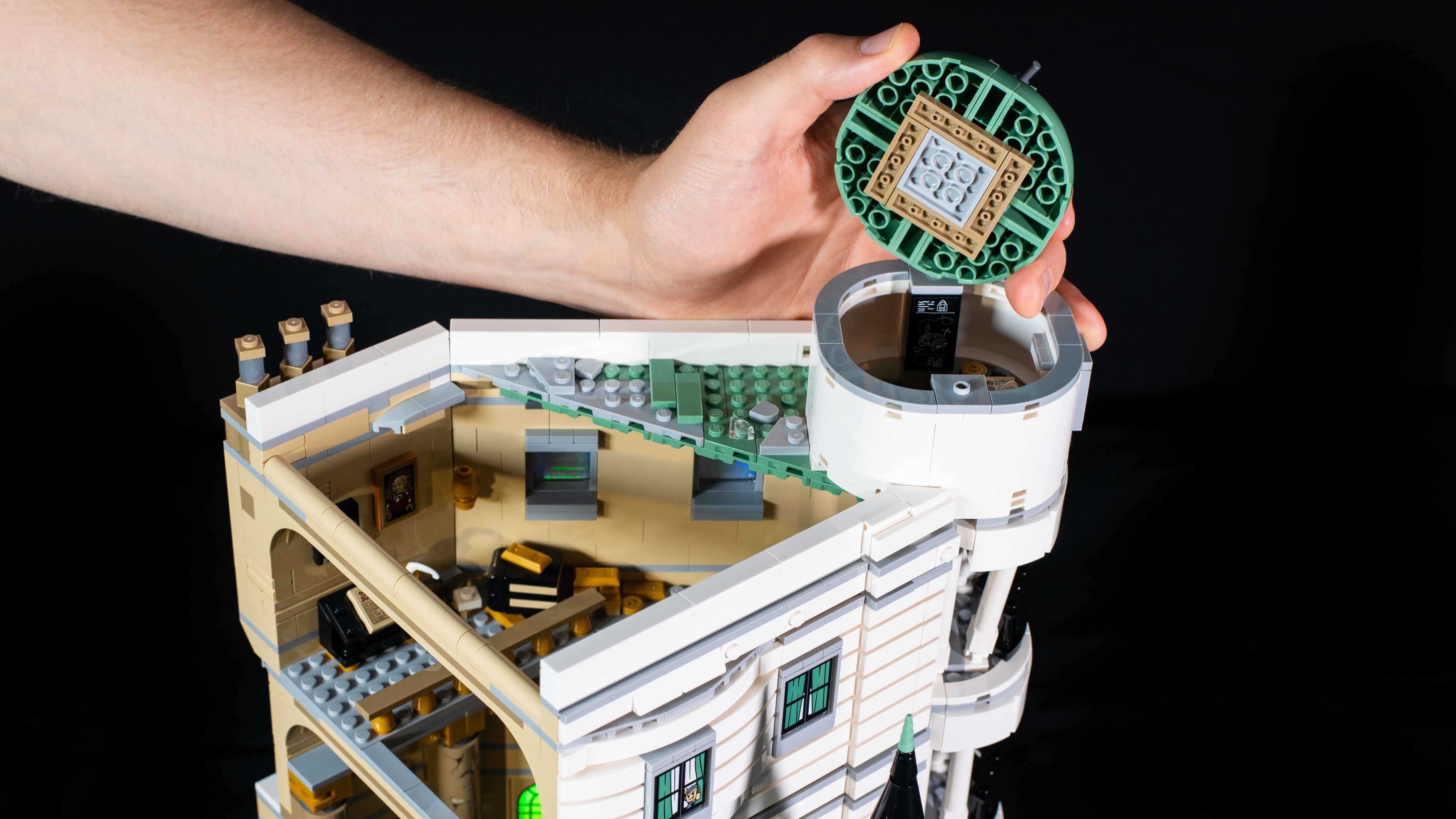
Moving up to the bank itself, the four-storey frontage is about as close to the prototype as you can imagine at this scale. Stack it up against an image of the aforementioned Gringotts Bank from the Wizarding World of Harry Potter and the proportions and angles are near-perfect. The skewed pillars are a highlight. They're created by mounting pillar pieces onto 1 x 1 tiles with clips and then cleverly locking them in place by constructing a cornice around them.
The SNOT-brick construction to create the beautiful marble walls is another highlight, and will be familiar to anyone who’s a fan of Lego’s modular buildings or the fantastic Sanctum Sanctorum (76218) in particular (MSRP $249.99 / £214.99).
Sure, we’re not convinced by the few slivers of grey bricks – likely included to add a little weathering – and it’s a shame the designers weren't able to replicate the marble cornice at the bottom of the two balconies. But we’re splitting bricks here, because the overall design really is that good.
What’s not good is the two stickers used to represent the engraving above the front entrance. This is the focal point of the entire build and by splitting the name into two stickers: “GRINGOT” and “TS BANK,” you’re left with what appears to be three, awkward words. Lego has stretched a single sticker across multiple pieces before, so we can't fathom why one long sticker wasn't used here. Ideally, it would have been printed but even then it would have been difficult to position the characters close enough together at the join to create a seamless word. But in a set this expensive, this innovative and this jaw-dropping, it's a real shame that this wasn’t remedied.
Another sticker-related problem is the side windows. We reckon physical frames like those on the front of the bank would have looked much better, serving as a tantalizing glimpse into the interior. But Lego’s decision to go with stickers isn’t the main problem, it’s the fact that these stickers are placed on transparent, frameless panes (they should have been black). What you end up with is a sticker surrounded by a thin, see-through border, which can look very untidy in the wrong light. If you plan on lighting the interior of your Gringotts, we’d recommend leaving off the stickers altogether, since the flat panes will look much better than light bleeding through the gaps between the stickers.
Still, replicating Gringotts’ sprawling Grand Banking Hall in Lego was always going to be a challenge and I think the designers have done a great job with the available space. I'm impressed that they managed to fit in five banking desks on the ground floor, as well as the centerpiece chandelier, but it’s not bursting with Easter eggs and details just for the sake of it. And that’s a good thing. Keeping the interior relatively clean and not at all cluttered adds to the sense of space and grandeur. The decision to make the second floor a mezzanine was a neat choice, too, meaning you get a little extra interior detail, while creating the illusion of a towering ceiling.
Keeping the interior relatively clean and not at all cluttered adds to the sense of space and grandeur
Move to the building’s roof and you'll find that the dome lifts off to reveal a tiny, doorless room. It lifts off a little too easy for my tastes, due to the perched dragon, but it’s yet to fall off. The rest of the roof isn't attached and slides off to gain better access to the interior. Stickers aside, the roof is perhaps the only disappointing aspect of this fine modular building’s design. In the Deathly Hallows: Part 2, the front dome is a secondary dome to the larger one that serves as a window light to the Grand Banking Hall.
This is the dome that the dragon bursts through and it’s represented here, only by a few clear windscreen-type pieces. We like how one is missing, with a few scattered transparent pieces used to represent shards of glass, but in a model that’s this ambitious, we can’t imagine a secondary dome was beyond the capabilities of this set’s talented design team, and it would have been the icing on the cake.
Not that there aren't some extra flourishes. The modular building is flanked via an attractive side wall, complete with a side entrance into the Grand Banking Hall, and a miniature building and side alley. Both of these inclusions should allow the set to butt against adjacent buildings in seamless fashion. The side building is the Magical Managerie, which is a real building from Diagon Alley, although it would appear some artistic licence has been used in its creation. It’s also worth noting that the building left of Gringotts Bank at the Wizarding World of Harry Potter features a similar miniature tower and spire.
Finally, the cobbled street in front of the bank looks fantastic. It’s a simple mix of rounded plates, which work beautifully together to create a convincing cobbled effect.
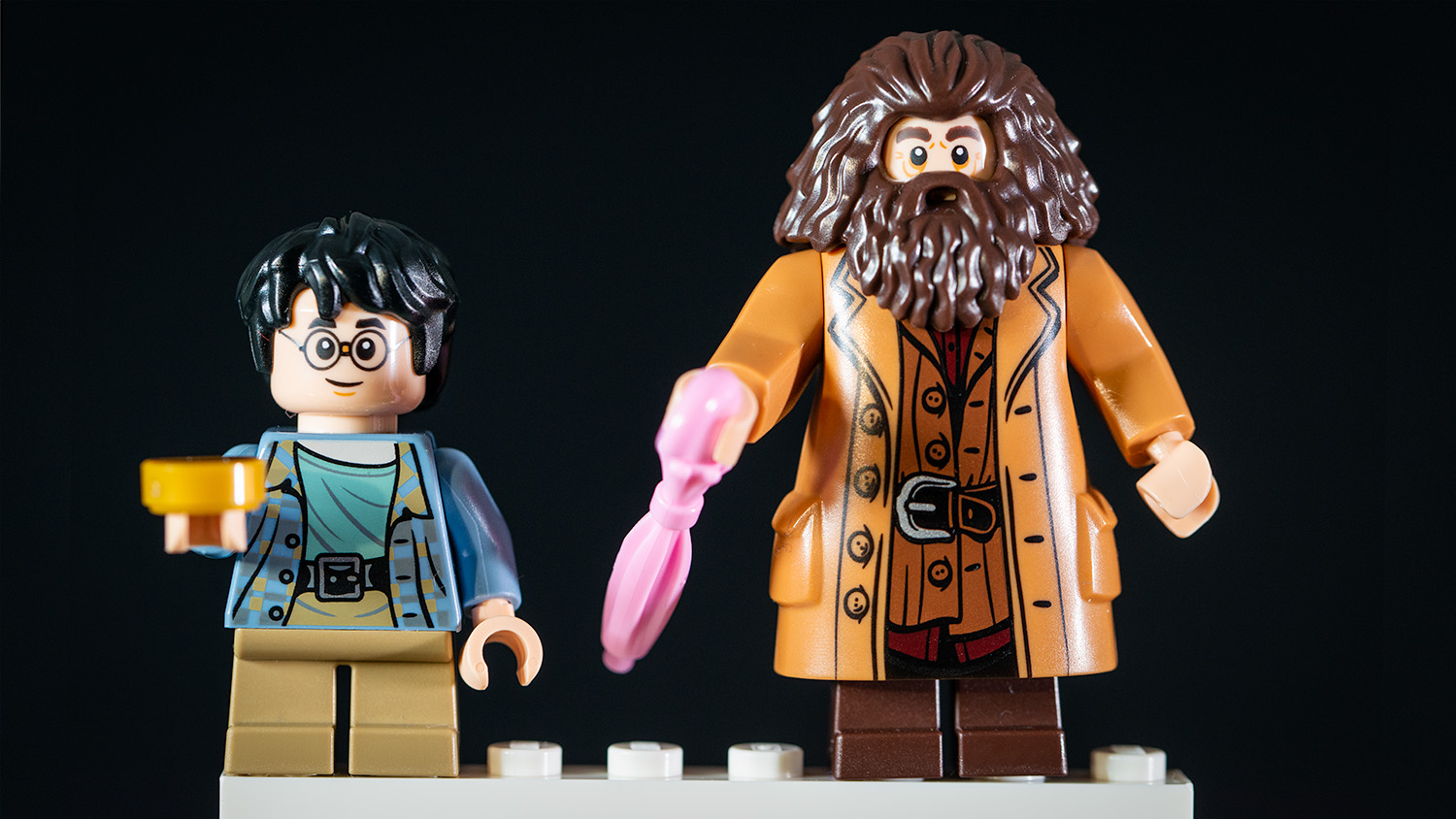


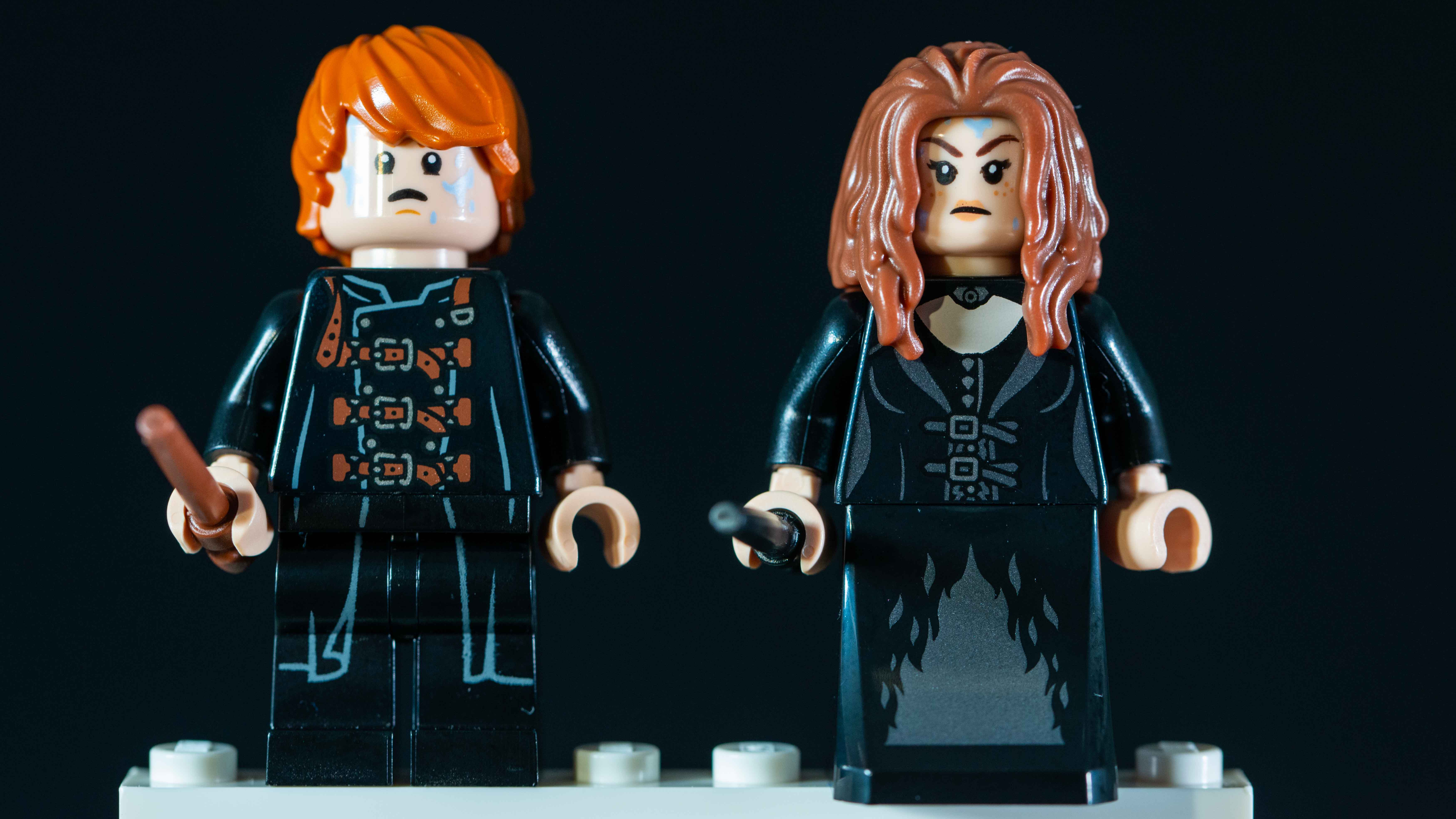

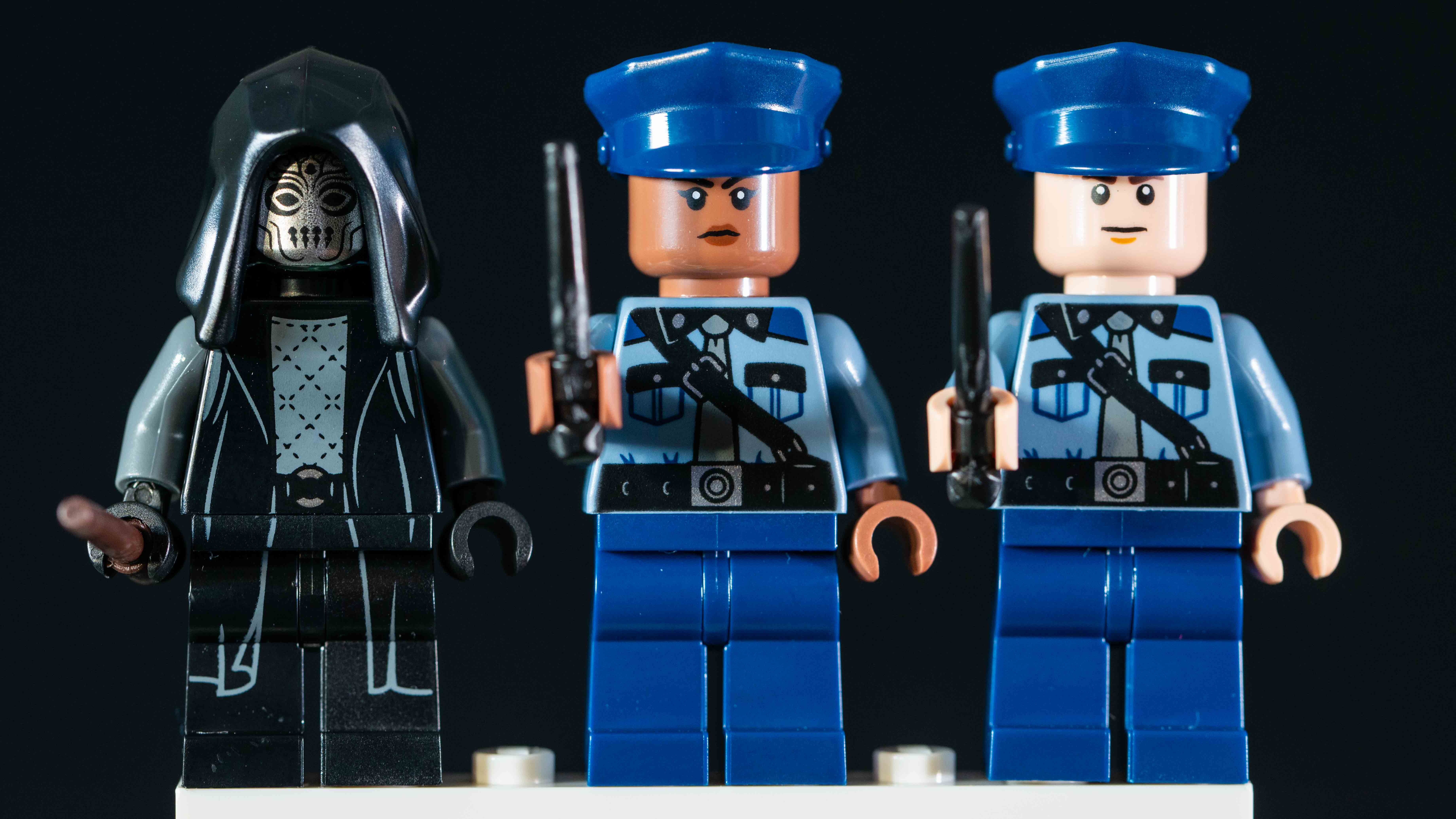
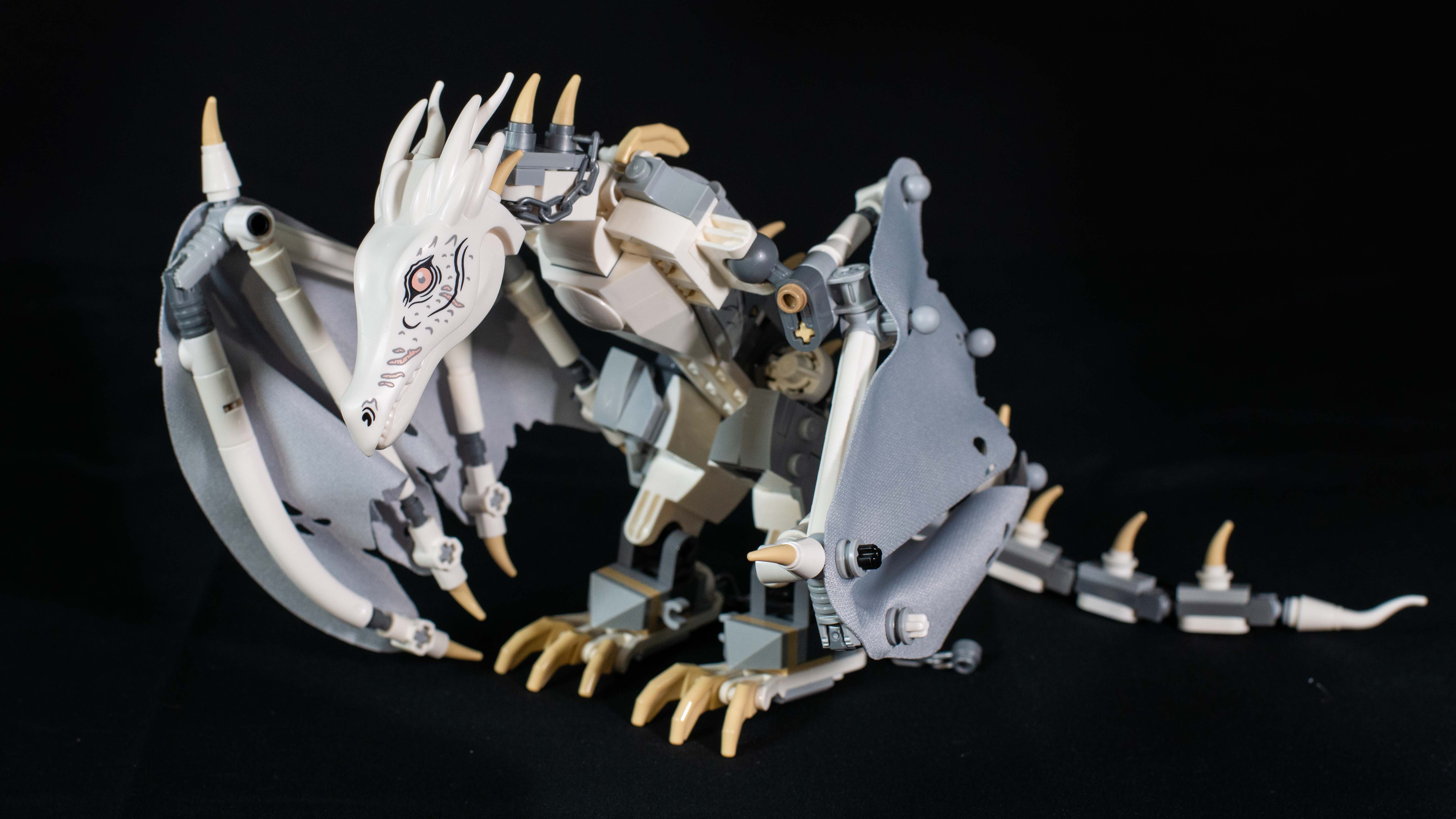
Let's cap off by visiting the 13-strong roster of minifigures. It's a respectable haul. For comparison, Diagon Alley retails for slightly more and contains just one additional minifigure, while the Hogwarts Express (MSRP $499.99 / £429.99) admittedly contains 20.
The minifigures represent two different films: The Philosopher's Stone and The Deathly Hallows: Part 2. The former is Rubeus Hagrid and a young Harry Potter, with the latter comprising an older Harry Potter, Dragomir Despard, Bellatrix Lestrange, Griphook, Bogrod, Ricbert, a Death Eater, and two guards. The Ravenclaw scholars among you may point out that Griphook was also in The Philosopher's Stone, but he’s in Deathly Hallows garb. You also get two generic goblins that will suit mock-ups of either film.
Every figure apart from Hagrid and the two guards have alternate faces
Dragomir and Bellatrix are each two characters in one. Spin their heads around to reveal the faces of Ron Weasley and Hermione Granger, respectively, with suitable hair pieces also included to complete the Polyjuice transformation.
In essence, the minifigures look good. You don’t tend to get the same level of arm, hip, and foot printing that’s prevalent on many Star Wars minifigures when it comes to Lego Harry Potter, but outfits do tend to be simpler. Griphook and the two generic goblins are the only examples that feature arm printing, but every figure apart from Hagrid and the two guards have alternate faces.
Bellatrix is my favourite. She features exquisite printing all over her dress – front and back – as well as an instantly recognisable hair piece and a fantastic, characteristically evil/snooty expression.
Should you buy the Lego Harry Potter Gringotts Wizarding Bank?
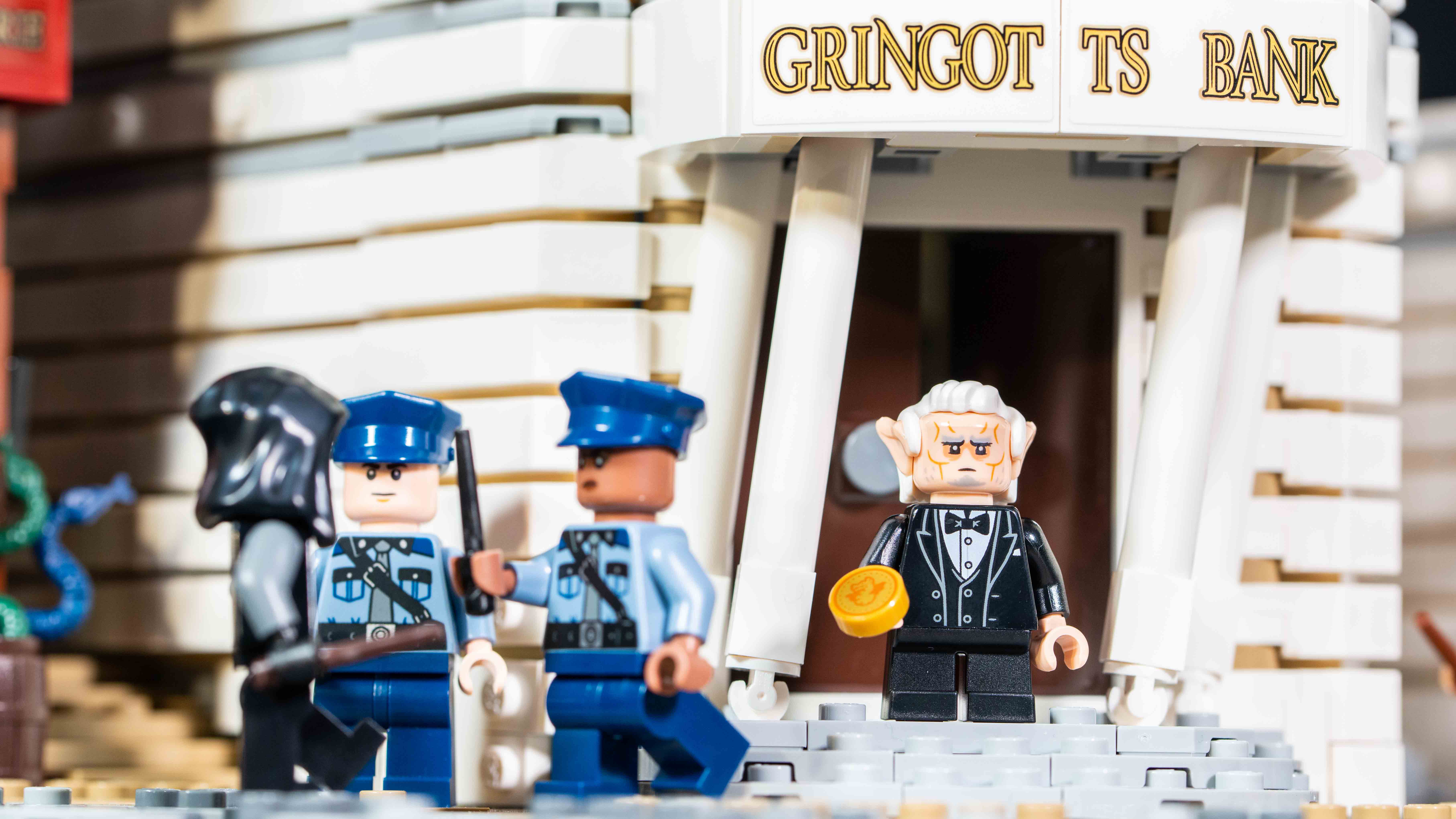
Honestly, I’d rather spend a night in Azkaban than score the Lego Harry Potter Gringotts Wizarding Bank. Giving a set this innovative, this lovingly designed, and this jaw-dropping anything less than a perfect five stars just doesn’t feel right. Especially when it's the stickers that are the biggest letdown.
But this is a holy grail playset. It’s the fourth largest and fourth most expensive Lego Harry Potter build of all time. And darn it, I just can’t let go of the split entrance engraving: “GRINGOT TS BANK”. Add to that the untidy window stickers and the lack of a rear dome for the dragon to burst through and I can’t quite conjure that extra half star, but it's close.
If you’re a Lego Harry Potter fan who’s been saving up your galleons to pick up this set, it’s a no-brainer. On the whole it’s a stunning modular building – maybe even one of Lego’s best. I was won over by the surprising level of detail in the underground vaults, and if you can look past those pesky stickers, the modular’s frontage is a nearly perfect representation of the magical bank.
The marble architecture has been expertly executed, every inch of the interior has been put to good use, and the Magical Managerie is a fun little side build to latch onto other modulars. And on top of all that, you’ve got one of the coolest dragons Lego has ever built. You just won't find another Lego set like it.
You do have to feel for anyone shelling out extra for the underground vaults when all they want to do is implement the modular into Diagon Alley, but despite my initial reservations when this set was announced, it works so well. I wouldn't be surprised if some forgo that long-anticipated Diagon diorama in favour of displaying this magical set how the designers intended.
4.5 points to Gryffindor – ahem – Lego!
Buy it if...
You're a thirty-something millennial
If you’ve taken the Pottermore Sorting Hat Quiz so many times you’re now unsure whether you’re Gryffindor or Hufflepuff, can remember queuing outside of a Waterstones at midnight before heading home to read the Order of the Phoenix in one sitting and are still, secretly awaiting your Hogwarts acceptance letter, then I’d suggest taking the Floo Network to your nearest Lego store.
You own the Lego Diagon Alley kit
Much has been said about the redundant underground vaults for anyone wanting to attach the bank to the modular Diagon Alley, but I reckon a clever set of shelves could sort that problem with the various shops and Gringotts Bank on one shelf and the vaults beneath. Regardless, this will definitely prove the centerpiece of your Diagon Alley diorama.
Don't buy it if...
You can't justify the gold galleons
There’s no doubt about it, this is an expensive set. And if you’re not willing to pick this one up at the expense of other Harry Potter builds, fear not. Diagon Alley: Weasleys' Wizard Wheezes (76422) (MSRP $89.99 / £84.99) looks to be the start of a range of smaller Diagon Alley builds, so I'm already crossing my wands for a smaller, more affordable Gringotts in the years to come.
You're not into modular buildings
Even if you’re not a Harry Potter fan, this is an excellent modular building in its own right. But if modulars simply aren’t your thing then you’re unlikely to enjoy building and displaying this set. Perhaps the Lego UCS X-Wing is more your thing?
How we tested the Lego Harry Potter Gringotts Wizarding Bank
Our reviewer – a Hogwarts alumnus – swears he put this entire set together in one sitting after it was sent to us by Lego. However, we suspect the involvement of reparo.
Most muggles will construct this set across multiple sittings, and the modular nature and four instructions booklets make it an ideal set to build with a friend or two.
For more information on our procedure, take a look at how we test products.
For more brick-based goodness, don't miss our guides to the best Lego Star Wars sets. You can also get some money off with these Lego deals.

When he's not putting together Lego or board game reviews for us, Mike is Deputy Editor of N-Photo: The Nikon Magazine. He also brings over 10 years of experience writing both freelance and for some of the biggest specialist publications.
